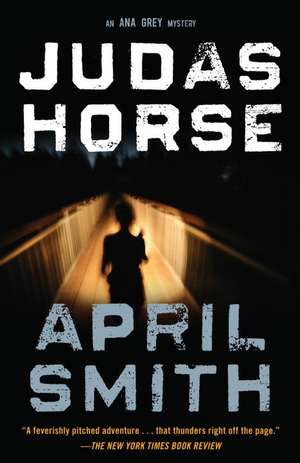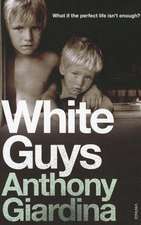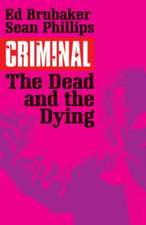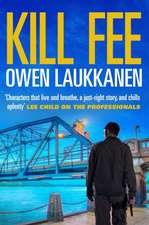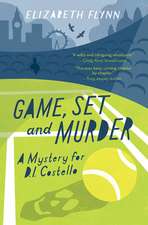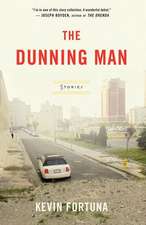Judas Horse: Special Agent Ana Grey
Autor April Smithen Limba Engleză Paperback – 31 ian 2009
Only months after a traumatic shooting incident, Ana is still emotionally unstable when she returns to work and learns that a fellow agent—and former lover—was killed by a group of terrorists operating under the name of FAN (Free Animals Now). To find the murderer and prevent any further killing, Ana goes undercover as an animal activist. In the course of her investigation, Ana encounters Julius Emerson Phelps, the charismatic leader of a "family" of anarchists in rural Oregon, whose secret past could blow the Bureau to pieces. To matters worse, Ana learns that Phelps is preparing a cataclysmic act of terrorism. With time ticking away and her undercover identity in jeopardy, Ana must find a way to solve her case and foil Phelp's bloody plot.
Preț: 96.93 lei
Nou
Puncte Express: 145
Preț estimativ în valută:
18.55€ • 19.41$ • 15.44£
18.55€ • 19.41$ • 15.44£
Carte disponibilă
Livrare economică 10-24 martie
Preluare comenzi: 021 569.72.76
Specificații
ISBN-13: 9780307390646
ISBN-10: 0307390640
Pagini: 318
Dimensiuni: 132 x 204 x 20 mm
Greutate: 0.24 kg
Editura: Vintage Books USA
Seria Special Agent Ana Grey
ISBN-10: 0307390640
Pagini: 318
Dimensiuni: 132 x 204 x 20 mm
Greutate: 0.24 kg
Editura: Vintage Books USA
Seria Special Agent Ana Grey
Notă biografică
April Smith is the author of North of Montana, Be the One, and Good Morning, Killer. She is also a television screenwriter and producer. She lives in Santa Monica with her husband and children.
Extras
Chapter One
I am standing in the middle of nowhere, eating an oatmeal cookie, when the word comes down the hallway like an ill wind that SAC Robert Galloway wants to see everyone in his office. I glance at the TV monitors—no airplane crashes—and figure this would be Galloway announcing with his usual gloomy hysteria that some honcho is coming from FBI headquarters, or maybe, because of budget cuts, we all have to bring our own copy paper.
The boss is waiting behind his desk, eyes downcast, fingertips tapping the blotter, and he does not speak or look up until the office is jammed with agents in shirtsleeves and wide-eyed administrative assistants. Cautious silence settles in.
“Another blow,” he says, because there are all kinds of blows, all day long.
The silence twists tighter.
“Special Agent Steve Crawford is dead.”
A collective gasp of shock. Some of us clutch, as if kicked in the gut.
“We have a positive ID on his remains.”
“How?” someone finally asks.
Galloway clears his throat. Everybody knows Steve Crawford was his golden boy and heir apparent.
“A hiker found a piece of jaw with a couple of teeth in a stream close to where Steve disappeared.” He takes a breath. “The forensic dentist matched the root furcation on the X-rays.”
“Cause of death?”
Galloway rubs his forehead. “He was an experienced hiker. A fall? Hypothermia? We don’t know. He was hiking alone. It’s a remote location. You have big animals, little animals; they’re dragging pieces hither and yon. The coroner says the manner of death is a very difficult call, based on the evidence and the length of time Steve was out there.”
It is like losing Steve all over again. Like those stomach-churning hours thrashing through the soaking undergrowth up in Oregon just days after I’d come back from administrative leave. I get sick just thinking about the empty yelping of those dogs.
When Steve had failed to call his wife, Tina, from a solo hiking vacation in the Cascades, his abandoned SUV was discovered at a trailhead. Four hundred volunteers scoured the national park, casting a net of inquiry from Eugene to Bend. Everyone from the Los Angeles field office went up on their own time to knock on doors. Worse, indescribably worse, were the visits to Steve and Tina’s house down here in Gardena—a dining table of foil-covered casseroles, two dazed grandmas from out of town, a couple of sisters, the scent of baby powder from the children’s room.
Standing now in Galloway’s superheated office, I do not want to hear the aren’t-I-smart questions. What does it matter if the molars have fillings or not? After weeks of uncertainty, there is no doubt. Steve is dead; at least his family has something to bury.
Seven months before, a crazed detective on a suicide mission tried to drag me into his car, and I shot him.
When you are involved in a shooting incident, they take away your weapon and credentials. You are no longer identified as a federal agent, no different from any bozo who cannot get past the metal detectors. There is an investigation by the Office of Professional Responsibility and what we call “critical incident training,” psychoanalyzing with other agents who have been through a life-changing trauma. When they decide you are ready to come back, the tradition is that another agent waits downstairs to “walk you in.”
Steve Crawford was waiting in the lobby of the federal building when I returned after seven insomnia-wracked months on administrative leave. In the FBI family, Steve and I were closer than most, having graduated in the same class at the Academy in Quantico, Virginia. Those who go through new agent training together are eternally bonded in young blood. We had shared many defining moments, but that image of Steve in the lobby is especially vivid, not only because of his kindness to me on that first awful day back but also because later, when he disappeared, I struggled to enhance every memory of him in the days before, in search of a detail that might explain why.
A tall drink of water with ash-blond hair, thirty-eight at the time, he was leaning on a counter with a distracted look, wearing a nylon strap around his neck with a clip on the end for ID tags and keys. We each have one, personalized with goofy stuff. His was red, white, and blue, studded with pins from police departments around the country and two teddy bears—representing many cases, years of work, and becoming a new dad. The lobby was crowded with civil servants and foreign nationals, but in the light streaming down through the atrium, all I saw was that strap, glinting with honor, and I was hungry for it.
“Everything all right?” he asked, touching my shoulder.
We were in the elevator. I stared at the floors ticking by.
“Why am I nervous? It feels like the first day of school.”
“You have plenty of friends on the playground,” Steve assured me.
After he got a law degree, and before he joined the Bureau, Steve played outfield during two seasons of minor-league baseball. He was the real thing. He knew all about disappointment and bone-wearying hard work. Sometimes I’d ask, “How many times in your life do you think you’ve swung a bat?” and he’d deadpan, “Not nearly enough.” No question he had the talent. If he’d wanted to make the majors and cash out, he would have. It was just that Steve Crawford cared more about helping people than he did about himself.
The elevator doors had opened and we stepped into a hall. Steve swiped his card. I followed through the secure door, fighting an embarrassing impulse to hold on to his hand. He got me through those first brutal hours; got my old handcuffs back, the weapon in its clip, the case in black dress leather that holds credential and badge. There was a drawer full of clean new key straps. I chose red, white, and blue.
“Take a breath,” he said. “You’ll be great.”
Just as I was getting my feet back on the ground, Steve Crawford was on his way to infinity.
The U.S. Federal Office Building on Wilshire Boulevard, isolated in a flat grass tract behind a queue of concrete bunkers, is a soulless tower meant to keep excitement out. If you had business here this morning in early spring, you might wonder at the numbers of dark-suited judges, cops, and politicians gathered beneath the breezy portico, and the white chairs set in rows. You might notice the Marine honor guard, and the guy in the kilt with the bagpipes, and figure out this is to be the annual FBI memorial service.
You could not know that SWAT is patrolling the perimeter, nor, from the chatter, that emotions are tender, because in this year’s program book there appears the handsome new face of Special Agent Steve Crawford beside the tough-guy G-men who died in the thirties, and the earnest boys wearing skinny ties, forever frozen in the fifties.
It is by now just a few weeks past the official identification of his remains. Tina is seated with their children in the front row, wearing the same black silk dress and shiny black straw hat she wore to the funeral, as if she has never taken off her widow’s weeds.
It would be nice, before stepping into the merciless sunshine, to rest for a moment in a circle of colleagues and let the feelings flow. I notice my former best friend, Barbara Sullivan, the bank robbery coordinator, commiserating with a couple of gals on her squad. They are whispering about Tina, and how she has still not been able to clean out Steve’s closets, trading stories about going through your childhood stuff and selling the house when your last surviving parent has died.
As I approach, they stop talking.
“Tough morning,” I say.
“Very sad.”
Nobody says anything.
“Steve loved the mountains,” I remark. “I hope they talk about that.”
“You knew him,” Barbara replies accusingly, as if it is my fault he went to the mountains and met with a fatal accident.
“Yes,” I say. “I miss his smile,” and I walk away in a backwash of silence.
When you are involved in a shooting incident, the Office of Professional Responsibility talks to all your friends. During my investigation, rocks were overturned concerning Barbara Sullivan’s handling of bank robbery witnesses who had been waiting to be polygraphed. Instead of placing the witnesses in a secure area, she had allowed them to wait in the hall. It was a meaningless oversight that had nothing to do with my case, but with typical Bureau anality, they could not let it go, and Barbara Sullivan, a working mom who puts in twice as much as everyone else, received a reprimand. Not my fault, but that kind of thing accumulates nasty gossip, like a snowball in dirt.
Even though OPR found my case to be a righteous shooting—that the detective was a disturbed individual and the choice was either his life or mine, with a good chance he might have taken out a couple of civilians, as well—I had become tainted meat and nobody much wanted me around. Behind my back, Barbara called me “a cowgirl,” and it stuck. The word was I had tried to be a hero and lost all judgment. Who wants to partner up with that?
Don’t be stupid; this isn’t high school. But at the memorial service, I sit well away from Barbara and her friends in their identical black trouser suits, white shirts, and flat rubber-soled shoes.
If this isn’t high school, why do they all have to be blond?
Over the roar of the nearby 405 freeway, I listen to the Bureau chaplain honor our dead: “True heroes live a life of goodness, and enter the battle between good and evil to make the world a better place. These are not just names on a piece of paper. These are people just like us, who put themselves in harm’s way, knowing each day could be their last, whose loved ones were sometimes afraid to kiss them good-bye in the morning . . . until the day they made the supreme sacrifice. They gave the last measure of devotion to defending freedom.”
The roll call procession has begun. A bell tolls for every name that is read, and a photograph of each fallen agent is carried by an honoree who also bears a yellow rose. There had been a spat about who should carry Steve’s memorial, but it went to Jason Ripley, because he is the newest agent.
I am battling for control. My facial muscles are twitching and hot tears threaten to break. This is the task: Never let it show. Rows of graven faces reveal nothing but discipline.
I have noticed that as you get older, you do not regret the affairs you’ve had, but the ones you didn’t have. What nobody here knows is that Steve and I were not just buddies who met as kids in our twenties at the Academy and went through new agent training together. We did exactly what new agents are not supposed to do: We fell in love. And despite the prohibitions of the time, we were going to get married. The painful circumstances that tore us apart hit me all over again as Jason Ripley passes, bearing a large color photo of Steve’s earnest all-American face—a testament, in so many ways, for so many people, to what might have been.
Jason, a twenty-eight-year-old skinny farmer’s son from Illinois, is doing a credible job of appearing not to be terrified. It must scare the heck out of him, standing in for a dead man; called upon to demonstrate the egalitarian nature of death, along with other agents and support staff (each carrying a photo and one yellow rose), hauled out of the faceless building and exposed in full daylight, made to walk in a single line at the same funereal pace—the alert, the self-conscious, the burdened, the humble, the casual, the aggressive, the broken.
For months after the shooting incident, I had headaches and malaise. I was on every type of med but still couldn’t make it through the night without sweating through at least one pair of pajamas. I’d get up and read in the living room—one light burning, a desert wind rattling the empty garbage cans, a storm of tiny flowers driven off the pittosporum trees—and like the homeowner who has iced an intruder, or a soldier who destroys a tank, I gained the special knowledge only righteous shooters share: Even the most selfless action, even the defense of your country, doesn’t mean a happy ending. They save the worst for the so-called hero.
I killed somebody.
Who am I?
From the Hardcover edition.
I am standing in the middle of nowhere, eating an oatmeal cookie, when the word comes down the hallway like an ill wind that SAC Robert Galloway wants to see everyone in his office. I glance at the TV monitors—no airplane crashes—and figure this would be Galloway announcing with his usual gloomy hysteria that some honcho is coming from FBI headquarters, or maybe, because of budget cuts, we all have to bring our own copy paper.
The boss is waiting behind his desk, eyes downcast, fingertips tapping the blotter, and he does not speak or look up until the office is jammed with agents in shirtsleeves and wide-eyed administrative assistants. Cautious silence settles in.
“Another blow,” he says, because there are all kinds of blows, all day long.
The silence twists tighter.
“Special Agent Steve Crawford is dead.”
A collective gasp of shock. Some of us clutch, as if kicked in the gut.
“We have a positive ID on his remains.”
“How?” someone finally asks.
Galloway clears his throat. Everybody knows Steve Crawford was his golden boy and heir apparent.
“A hiker found a piece of jaw with a couple of teeth in a stream close to where Steve disappeared.” He takes a breath. “The forensic dentist matched the root furcation on the X-rays.”
“Cause of death?”
Galloway rubs his forehead. “He was an experienced hiker. A fall? Hypothermia? We don’t know. He was hiking alone. It’s a remote location. You have big animals, little animals; they’re dragging pieces hither and yon. The coroner says the manner of death is a very difficult call, based on the evidence and the length of time Steve was out there.”
It is like losing Steve all over again. Like those stomach-churning hours thrashing through the soaking undergrowth up in Oregon just days after I’d come back from administrative leave. I get sick just thinking about the empty yelping of those dogs.
When Steve had failed to call his wife, Tina, from a solo hiking vacation in the Cascades, his abandoned SUV was discovered at a trailhead. Four hundred volunteers scoured the national park, casting a net of inquiry from Eugene to Bend. Everyone from the Los Angeles field office went up on their own time to knock on doors. Worse, indescribably worse, were the visits to Steve and Tina’s house down here in Gardena—a dining table of foil-covered casseroles, two dazed grandmas from out of town, a couple of sisters, the scent of baby powder from the children’s room.
Standing now in Galloway’s superheated office, I do not want to hear the aren’t-I-smart questions. What does it matter if the molars have fillings or not? After weeks of uncertainty, there is no doubt. Steve is dead; at least his family has something to bury.
Seven months before, a crazed detective on a suicide mission tried to drag me into his car, and I shot him.
When you are involved in a shooting incident, they take away your weapon and credentials. You are no longer identified as a federal agent, no different from any bozo who cannot get past the metal detectors. There is an investigation by the Office of Professional Responsibility and what we call “critical incident training,” psychoanalyzing with other agents who have been through a life-changing trauma. When they decide you are ready to come back, the tradition is that another agent waits downstairs to “walk you in.”
Steve Crawford was waiting in the lobby of the federal building when I returned after seven insomnia-wracked months on administrative leave. In the FBI family, Steve and I were closer than most, having graduated in the same class at the Academy in Quantico, Virginia. Those who go through new agent training together are eternally bonded in young blood. We had shared many defining moments, but that image of Steve in the lobby is especially vivid, not only because of his kindness to me on that first awful day back but also because later, when he disappeared, I struggled to enhance every memory of him in the days before, in search of a detail that might explain why.
A tall drink of water with ash-blond hair, thirty-eight at the time, he was leaning on a counter with a distracted look, wearing a nylon strap around his neck with a clip on the end for ID tags and keys. We each have one, personalized with goofy stuff. His was red, white, and blue, studded with pins from police departments around the country and two teddy bears—representing many cases, years of work, and becoming a new dad. The lobby was crowded with civil servants and foreign nationals, but in the light streaming down through the atrium, all I saw was that strap, glinting with honor, and I was hungry for it.
“Everything all right?” he asked, touching my shoulder.
We were in the elevator. I stared at the floors ticking by.
“Why am I nervous? It feels like the first day of school.”
“You have plenty of friends on the playground,” Steve assured me.
After he got a law degree, and before he joined the Bureau, Steve played outfield during two seasons of minor-league baseball. He was the real thing. He knew all about disappointment and bone-wearying hard work. Sometimes I’d ask, “How many times in your life do you think you’ve swung a bat?” and he’d deadpan, “Not nearly enough.” No question he had the talent. If he’d wanted to make the majors and cash out, he would have. It was just that Steve Crawford cared more about helping people than he did about himself.
The elevator doors had opened and we stepped into a hall. Steve swiped his card. I followed through the secure door, fighting an embarrassing impulse to hold on to his hand. He got me through those first brutal hours; got my old handcuffs back, the weapon in its clip, the case in black dress leather that holds credential and badge. There was a drawer full of clean new key straps. I chose red, white, and blue.
“Take a breath,” he said. “You’ll be great.”
Just as I was getting my feet back on the ground, Steve Crawford was on his way to infinity.
The U.S. Federal Office Building on Wilshire Boulevard, isolated in a flat grass tract behind a queue of concrete bunkers, is a soulless tower meant to keep excitement out. If you had business here this morning in early spring, you might wonder at the numbers of dark-suited judges, cops, and politicians gathered beneath the breezy portico, and the white chairs set in rows. You might notice the Marine honor guard, and the guy in the kilt with the bagpipes, and figure out this is to be the annual FBI memorial service.
You could not know that SWAT is patrolling the perimeter, nor, from the chatter, that emotions are tender, because in this year’s program book there appears the handsome new face of Special Agent Steve Crawford beside the tough-guy G-men who died in the thirties, and the earnest boys wearing skinny ties, forever frozen in the fifties.
It is by now just a few weeks past the official identification of his remains. Tina is seated with their children in the front row, wearing the same black silk dress and shiny black straw hat she wore to the funeral, as if she has never taken off her widow’s weeds.
It would be nice, before stepping into the merciless sunshine, to rest for a moment in a circle of colleagues and let the feelings flow. I notice my former best friend, Barbara Sullivan, the bank robbery coordinator, commiserating with a couple of gals on her squad. They are whispering about Tina, and how she has still not been able to clean out Steve’s closets, trading stories about going through your childhood stuff and selling the house when your last surviving parent has died.
As I approach, they stop talking.
“Tough morning,” I say.
“Very sad.”
Nobody says anything.
“Steve loved the mountains,” I remark. “I hope they talk about that.”
“You knew him,” Barbara replies accusingly, as if it is my fault he went to the mountains and met with a fatal accident.
“Yes,” I say. “I miss his smile,” and I walk away in a backwash of silence.
When you are involved in a shooting incident, the Office of Professional Responsibility talks to all your friends. During my investigation, rocks were overturned concerning Barbara Sullivan’s handling of bank robbery witnesses who had been waiting to be polygraphed. Instead of placing the witnesses in a secure area, she had allowed them to wait in the hall. It was a meaningless oversight that had nothing to do with my case, but with typical Bureau anality, they could not let it go, and Barbara Sullivan, a working mom who puts in twice as much as everyone else, received a reprimand. Not my fault, but that kind of thing accumulates nasty gossip, like a snowball in dirt.
Even though OPR found my case to be a righteous shooting—that the detective was a disturbed individual and the choice was either his life or mine, with a good chance he might have taken out a couple of civilians, as well—I had become tainted meat and nobody much wanted me around. Behind my back, Barbara called me “a cowgirl,” and it stuck. The word was I had tried to be a hero and lost all judgment. Who wants to partner up with that?
Don’t be stupid; this isn’t high school. But at the memorial service, I sit well away from Barbara and her friends in their identical black trouser suits, white shirts, and flat rubber-soled shoes.
If this isn’t high school, why do they all have to be blond?
Over the roar of the nearby 405 freeway, I listen to the Bureau chaplain honor our dead: “True heroes live a life of goodness, and enter the battle between good and evil to make the world a better place. These are not just names on a piece of paper. These are people just like us, who put themselves in harm’s way, knowing each day could be their last, whose loved ones were sometimes afraid to kiss them good-bye in the morning . . . until the day they made the supreme sacrifice. They gave the last measure of devotion to defending freedom.”
The roll call procession has begun. A bell tolls for every name that is read, and a photograph of each fallen agent is carried by an honoree who also bears a yellow rose. There had been a spat about who should carry Steve’s memorial, but it went to Jason Ripley, because he is the newest agent.
I am battling for control. My facial muscles are twitching and hot tears threaten to break. This is the task: Never let it show. Rows of graven faces reveal nothing but discipline.
I have noticed that as you get older, you do not regret the affairs you’ve had, but the ones you didn’t have. What nobody here knows is that Steve and I were not just buddies who met as kids in our twenties at the Academy and went through new agent training together. We did exactly what new agents are not supposed to do: We fell in love. And despite the prohibitions of the time, we were going to get married. The painful circumstances that tore us apart hit me all over again as Jason Ripley passes, bearing a large color photo of Steve’s earnest all-American face—a testament, in so many ways, for so many people, to what might have been.
Jason, a twenty-eight-year-old skinny farmer’s son from Illinois, is doing a credible job of appearing not to be terrified. It must scare the heck out of him, standing in for a dead man; called upon to demonstrate the egalitarian nature of death, along with other agents and support staff (each carrying a photo and one yellow rose), hauled out of the faceless building and exposed in full daylight, made to walk in a single line at the same funereal pace—the alert, the self-conscious, the burdened, the humble, the casual, the aggressive, the broken.
For months after the shooting incident, I had headaches and malaise. I was on every type of med but still couldn’t make it through the night without sweating through at least one pair of pajamas. I’d get up and read in the living room—one light burning, a desert wind rattling the empty garbage cans, a storm of tiny flowers driven off the pittosporum trees—and like the homeowner who has iced an intruder, or a soldier who destroys a tank, I gained the special knowledge only righteous shooters share: Even the most selfless action, even the defense of your country, doesn’t mean a happy ending. They save the worst for the so-called hero.
I killed somebody.
Who am I?
From the Hardcover edition.
Recenzii
"A feverishly pitched adventure . . . that thunders right off the page."—The New York Times Book Review“A pulse-pounding thriller.”—USA Today “Fast, harrowing, and breathtaking.”—The New York Sun"A genuinely scarifying thriller . . . has the momentum of a theme-park ride."—Los Angeles Times“Why does the FBI still seem so sexy? Part of the reason is murder mysteries like April Smith’s Judas Horse . . . It’s creepy, chest-thumping stuff, with snitches and loyalty tests and the good guys and villains constantly in flux.”—Los Angeles Magazine“Smith’s superb third thriller to feature Ana Grey . . . Ana’s nuanced and coolly observational narrative voice perfectly complements the well-paced action, which builds to a satisfying conclusion that leaves open the next chapter of Ana’s story.”—Publishers Weekly (starred)“Smith does a convincing job of conveying the trials of maintaining a dual identity . . . The narrative is fast-paced without becoming frantic, and the intertwining story lines are deftly handled. Highly recommended.”—Library Journal (starred)“A demonic ride through undercover terrain . . . Smith creates an undercover training regime for Ana that the FBI might do well to emulate. She’s so expert at implanting stress that you could become bipolar just from reading one chapter. Feisty, disturbing and exceptionally well done.” —Kirkus Reviews (starred)
Descriere
In this riveting thriller, FBI agent Ana Grey returns to infiltrate the volatile core of an eco-terrorist cell, in this latest Ana Grey mystery called fast, harrowing, and breathtaking ("The New York Sun").
